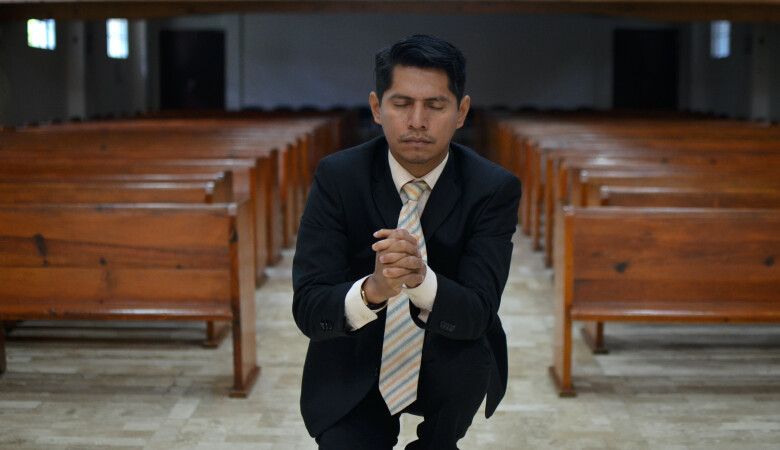How God Provides Spouses for His People
February 06, 2005 | Andy Davis
Genesis 24:1-67
Marriage and Parenting
Pastor Andy Davis preaches a verse-by-verse expository sermon on Genesis 24. The main subject of the sermon is how God provides spouses for His people.
- SERMON TRANSCRIPT -
Introduction: A Parable about a Garden
If you would open your Bibles to Genesis 24, this really is the third of three sermons on Genesis 24, the longest chapter in Genesis. And if you want to get my treatment of the whole thing, you'd have to listen to all three messages. The sad thing is there have been a number of weeks in between, so it's hard to see the flow. But in the first week, we unfolded the chapter and looked at it, section by section, looked at what happened in the account. The second week of considering Genesis 24, we looked at it theologically, got some principles from it. This really is a week of application. So it will end up feeling like a different kind of message than I usually preach. I'm not going to be going text by text, verse by verse. Not everything I say is going to be immediately connected to a text of Scripture. So it's gonna end up feeling much like application the whole way. But that's alright, because I think we need the applications to our modern life and to our everyday way of living that the Scripture gives us.
I was reading a wonderful book on courtship and on marriage called Her Hand in Marriage by Douglas Wilson, and he ends the book with a wonderful parable, and I wanna begin my message with that parable:
As my horse trotted wearily up the road, I could see the walls of a beautiful garden ahead. Outside the gate was an equally beautiful woman. At the sound of my greeting, she turned and dropped a curtsy. “Good sir. . . good morning.”
I looked at her, and then at the garden walls extending out to the right and left. Behind her was the garden gate. I said, “I am very thirsty. . . for something clean.” She smiled, and her smile made me thirstier still. But she said nothing. “Is there water here?” I asked.
“There is a stream within my garden.” Her statement was simply a statement of fact; there was no invitation at all in it.
I asked, “May I come in and drink?”
“No,” she said. “The lord of my mother’s garden does not permit that.”
“Why is this? Other women have let me drink from the gardens that they tend.” I glanced at the fruit-laden branches which were visible over the top of the garden wall. “You have a lovely garden, but those who let me drink had gardens just as beautiful.”
She laughed at this, and her laugh was merry indeed. “I have no doubt that you have been in some lovely gardens. But was the water clean?”
“No,” I said, and in spite of myself, turned my head and looked down.
She continued with a question. “Is that why you are no longer in the gardens tended by these women?”
I was ashamed so I did not answer her. Instead I looked past her into the garden. The path through the gate disappeared after a few feet, leaving the view of anyone on the road. “It seems like a shame for such a garden to go to waste.”
She seemed both puzzled and amused. “How does it go to waste?”
“Does any man drink from your stream?”
“No, but no man fouls it either.”
“But is that not a waste? Was not your stream made to quench the thirst of travelers?”
“I’m afraid you are seriously mistaken. It was made to quench the thirst, not of travelers, but of the lord of the garden.”
“Oh,” I said, “This garden has a lord?”
“No,” she said.
“Then I don't understand. Are you speaking in riddles?”
She smiled. “No, I do not. The garden will one day have a lord, although it does not yet. The stream is for him alone.”
“And who will your lord be?”
“When my mother’s lord gives a-blessing, the one whom I appoint.”
“How can the lesser appoint the greater?”
“How can it not be so? When my lord comes, I will grant to him my garden. But until I do, he is just another traveler.”
“And what do you look for? I am sure there are many who knock at your gate.”
At this she blushed slightly but looked straight at me. “I will not have a lord who does not have a lord himself — my lord must have taken an oath of fealty to the Landlord.”
“The Landlord? Who is he?”
“He is the owner of all the gardens along this road. In order to come into my garden, my lord must take an oath before the Landlord to tend the garden well. He must also swear that he will enter no other garden.”
I had never heard such words as these before. “How long must he stay out of other gardens?”
“Forever.”
“But what if he is born to travel?”
“Then he is not born for my garden.”
“I see,” I said, becoming a little angry. “Then why have I never heard of such an oath? I have been in many gardens.”
“Yes, you said that before. But was the water clean? Were the gardens tended? That is what happens when there is no oath.”
“So that is all? If someone takes an oath before this Landlord, you will make them your lord?”
“No.”
“Well, what else then?”
“There are many men who think they can tend my garden well, and who would be willing to swear an oath before the Landlord saying so. But that does not mean that my mother’s lord, or I, share their confidence.”
“What do you mean?”
“I mean that I know the extent of the garden. I have a knowledge of it that cannot be gained from the road. But no man can share that knowledge until after I have made him my lord and husband. So I must have the measure of the man before.”
“So what must a man do? It seems like much work.”
She smiled once again. “There is much work. There is also much fruit.”
“So what must a man do?”
“The first thing is to—”
“Yes, I know; He must swear to the Landlord. But after?”
“He must return to me, and ask to see my mother’s lord.”
“And what would he say?”
“That depends on the man.”
At this parting comment, she turned and walked slowly back into the garden, pulling the gate closed behind her. I spurred my horse, which began to trot down the road. I did not know what to think, but I needed to find this Landlord.
Isn't that a marvelous parable? It's an incredible insight, I think, that Douglas Wilson has into marriage and into the way that it should be. But the way that sadly it isn't. It reminds us, it seems of a day gone by, a day in which daughters were protected by their fathers and held in special purity until they were given in marriage, a day when a father stood up on that special day and answered the question, “Who gives this woman to be married to this man?” When the sweet culmination of all of his efforts for years and years results in this statement, “I do. Her mother and I have shaped and prepared this precious gift for this man. We have protected her chastity; we can vouch for her purity. Furthermore, we have thoroughly investigated him. We have found him mature and godly, fully ready to support her and the children that they will bear together. We deem that he will lead her and be a godly Christlike head to her. Therefore trusting in the Lord, I give her, I give this man, to be his wife. Henceforth, she will submit to his godly headship; she will be his.” Those days of courtship and purity seem to be gone forever, but I believe they are not. And it's in that confidence that I stand before you today. The basis of my statements come from the things we've learned in Genesis 24.
I. God’s Gift to Isaac: Rebekah
Now, Genesis 24 consists of an account of God's gift to Isaac and that was precious Rebekah. Now we talked about how Abraham charged his servant to go and to find a wife for his son Isaac in verses 1-9. And Abraham's servant went, in obedience to his master Abraham, went on a journey, went back to Abraham's ancestral home. And he prayed a model prayer, trusting in God to lead him to the right woman for Isaac, and God answered providentially. And immediately, he wasn't made to wait, but she was provided immediately. Rebekah watered the camels. The servant, having talked to her a little bit, knew that she was the one. Then Rebekah's family learned of God's providence in verses 28-49. And in verses 50-60, they submit to God's providence. She agrees, as you heard in the reading, to go back with the servant. She sees Isaac, Isaac sees her, she covers herself with the veil. He takes her into her mother's position in the group and into her tent; they are married, and it says that he loved her.
And so we see from that point on the unfolding of their beautiful marriage together. It's a story of God's marvelous gift, of His provision of Rebekah, for Isaac. Well, that's the way it was then. We've talked, as I said already, in two sermons about Biblical principles that can be drawn from it.
II. A Critique of the Modern Scene
Now I want to apply it to what's going on today. I want to critique the modern scene. What is happening today? Well, first of all, recreational dating is assumed. It's just assumed that people, it's just as normal as apple pie and growing up and learning to drive and all that, that people are going to date recreationally. As a matter of fact, some Christian families consider themselves especially moral if they wait until 16 or 17 to allow their children to go out on these recreational dates. Well, what is recreational dating? Well, it's the practice of members of the opposite sex who are unprepared and or unwilling to be married, spending intentional time alone for the sole purpose of recreation.
Part of this system assumes certain privileges accruing as time goes on, usually of a physical nature, beginning with hand holding and then kissing and hugging and long times alone with no accountability, more and more privileges that used to be given only to a spouse. The Christian parents are more or less left totally out of the picture and ever increasingly so, wringing their hands as they send off their daughter in the car of a young man, hoping they trained her well enough to resist his inevitable advances. That's the modern scene.
What is recreational dating? Well, Jonathan Lindvall says, " The essence of dating is flirting. Dating is recreational romance in which each party intentionally endeavors to cultivate the other's desire, while recognizing the relationship is most likely temporary.” Douglas Wilson, in his book that I mentioned, Her Hand in Marriage, puts it this way : “Consider how our system works. A young man notices a girl who attracts him. He asks her out and she agrees. They start going together, and one of two things happens. Either they like each other or they don’t, and both possibilities bring problems in their train. If neither one likes the other, then they have both had a bad experience. If they both hit it off, then the eventual temptation to immorality is strong, especially if they happened to pair off young — fourteen, say. ‘Glad you kids like each other! Now don’t touch anything for eight more years!’ ‘Okay, Mom!’ And of course if one is interested and the other isn’t, the possibilities for emotional snarls and interesting complications is almost endless.”
So what happens? We go through these recreational dating patterns. And then as we get older and older, we start to feel that we're ready for our soul mate, our soulmate. In the Christian context, that means a wife, or a husband — a spouse. And so having been through all of these relationships, we're ready now to search for a spouse. That’s recreational dating described.
What are the dangers of this system? I see four. The longer a couple stays together, the greater the possibility for serious damage in each of these four areas or in some of them. First, of course, there's sexual immorality. There is the ever escalating pressure for sexual immorality. God's standards never change. And our culture, the culture that's surrounding Christian people, is supersaturated with sexual innuendo and bad examples, and displays, whether in movies, television, printed media, whatever, all of it pulling us toward immorality. The problem... One of the problems with the church today is that we give young people just enough Christianity to make them feel horribly guilty if they should cave in, but not enough Christianity to protect them ahead of time. Part of my goal today is to help protect ahead of time. That's my desire. So first, sexual immorality.
Secondly, emotional damage. Even if there's no direct immorality, even if the couple maintains purity, the recreational dating system results in a tremendous amount of emotional pain. Proverbs 4:23 says, "Above all else, guard your heart. For from it, flows the wellspring of life." This verse commands us to set, as it were, a protective wall around our hearts so that we are protected from hurt lest our springs be stolen or corrupted, sounds a little bit like the parable we heard at the beginning. Guard your heart, protect yourself. Too many people involved in recreational dating find their hearts being stolen and hurt. And this repeated pattern results in agony, has a hardening effect on the heart.
Lindvall puts it this way. "In breaking up these two hearts that have begun bonding, are ripped apart, they each leave the relationship with at least some degree of heartbreak. They might either display varying degrees of emotional devastation, or simply toughen their feelings. Either way, they leave the relationship emotionally wounded or scarred. But soon, the pain of breaking up is forgotten as they develop a new romance with a different partner. In time, however, this relationship results in another heartbreak and more emotional wounds that leaves scars. Over a period of several years, a young person will experience a number of such emotional bonds being severed. Some of the romances are serious, and others admittedly so casual that breaking up is hardly painful at all, yet the cumulative effect is that the young people's hearts are becoming increasingly calloused. That's the second danger, emotional damage.
The third is what some people call divorce training. Divorce training. People go from one committed relationship to the next, learning how to say goodbye to the boyfriend or girlfriend who for a time was the center of their world. Some songs even make light of this whole thing. You may remember Paul Simon's Fifty Ways to Leave Your Lover: "You just slip out the back, Jack. Make a new plan, Stan. Don't need to be coy, Roy." I'm not gonna sing it, but anyway you know the song, "Just get yourself free hop on the bus, Gus. You don't need to discuss much. Just drop off the key, Lee. And get yourself free."
You just know how to do it. You know how to get out of a relationship. Well, after years of bouncing from one relationship to the next, the person has formed the techniques of breaking off a significant relationship. And the fourth is overemphasis on the emotion or passion of love. What the song sing about all the time. The feelings, which are very much there and should be part of a relationship, but are they the foundation of a marriage? Is that a good bedrock on which to build the structure, the feelings, the passions? When I was growing up, I remember watching this movie with my parents, and maybe some of you older folks have seen it, South Pacific. It talks there about some enchanted evening, when you'll see a stranger across a crowded room, and you're gonna walk across that room, and you're gonna meet your true love. And from then on, you're gonna be together. And if you miss her that night, you will have missed your life's true love. Well, that doesn't seem Biblical to me. It doesn't seem the right way to go about finding a spouse, on some enchanted evening or waiting for that enchanted evening, or endlessly reading about such enchanted evenings until finally you meet your prince. Is this the right way to do it? It doesn't seem that way. It seems rather that there's a more solid, more Biblical foundation of a young man and a young woman getting together.
Now, the core idea of dating is that we're going to marry the one we love. We're going to fall in love and get married. First comes love, then comes marriage, then comes baby in the baby carriage. That's how it works. That's the order. That's in the Bible somewhere, I'm sure isn't it? I haven't found it. But anyway, that's the order.
Interestingly, though, if you still have your Bibles open, look at Genesis 24:67. Genesis 24:67. It says there, "Isaac brought her into the tent of his mother, Sarah, and he married Rebekah. So she became his wife, and he loved her." Now isn't that amazing? She became his wife, and he loved her. You know, some godly people will say, “I didn't really know what love was until I've been married a number of years. I wouldn't really say I even truly love my wife,” they will say, “when I stood at the altar. I wanted to. I wanted to learn, but I didn't know what Ephesians 5 Christ-like love was until I got married.” And that's the love that is a solid foundation, and it takes years to develop and grow in that kind of love. The feelings that happen on that “some enchanted evening across a crowded room are important, but they're no solid foundation for a lasting relationship.”
Exceptions Prove the Rule
Now, exceptions can perhaps sometimes prove the rule. You may say, “Well, you know, that's the way I found my spouse.” That is literally true in the case of the preacher. That's how we found it. It wasn't exactly like that. But it is possible to go through the recreational dating scene. There was no other way that I was aware of when I was growing up. This is the way it was. What I'm preaching today, I didn't know anything about, and many of you probably have never heard anything about it either. So, you know, some people actually are able to avoid the deep pain, the scarring, they're able to avoid sexual immorality, they're able to find a godly spouse, they're able to settle down and have a model marriage.It can happen. But Douglas Wilson, in his typically humorous style, critiqued that as well. He said people survive plane crashes too, some of them without a scratch, and we should all be happy about it. But this acknowledgement does not disqualify us from opposing the general habit of crashing airplanes.
Good, But Inadequate
So I think I agree with that humorous comment, I think that the whole system needs to be looked at again. What is happening there? What is going on? Nowadays, there is a good, but I would call inadequate trend against Christian dating. Jonathan Harris, in his book I Kissed Dating Goodbye and other books advocating the similar themes. Some of them are better than others, but many of them miss some key elements. For example, the father's role, the Biblical role of the father in protecting the purity and chastity of the daughter before marriage, the covenant nature of marriage and the normative nature of marriage, that marriage is essential to God's redemptive plan. Not in the same way it was for Isaac and Rebekah — they were unique in God's redemptive history but still essential to God's redemptive plan. These books more talk about freedom to serve Christ and waiting until you meet the right one and all that, and those things are important, and they are lesser blessings, I think, but they miss these core values of what marriage really is.
III. Advocating a Better Way: “Courtship” or “Biblical Dating”
I'd like to advocate a better way, and right from the start... I don't know what to call it. Alright. I've had long discussions with Jeremy about the word courtship, and it has its problems (the term, I mean — “courtship”). Wilson puts it this way, "For some, courtship means that we must all become retro prairie muffins. The one being courted wears a gingham dress and a bonnet, and the one courting rides his horse over from the Taylor Ranch after church on Sunday, and there they sit on the front porch, swinging and drinking lemonade."
Is that what courtship is? That sounds kind of old-fashioned. Well, some go even further back to the days of Camelot and a knight and the fair maiden and all that kind of thing. If you really find out what courtship was like back then, frequently she was married to somebody else, and so that whole thing has some baggage to it as well. So what term are we going to use? Courtship, others advocate the term Biblical dating, but dating has so much of a bankruptcy to it, I think, that you really almost wanna get away from that term entirely, and so we end up with the gingham dress courtship thing, until we come up with a better term. And I don't really know what that term would be. I think until we develop a culture of doing this thing Biblically, a single man and a woman getting together in a Biblical pattern, we're not really gonna have a terminology for it, but that's what I'm talking about. How does God provide spouses for his people? That's the title of the sermon. That's what we're talking about. If we wanna call it courtship, fine. If you have another term, come and talk to me after the service. I'd like to know what it would be.
IV. Parental Role in their Children’s Marriage
But what do I mean by courtship? Well, let me give this definition. Courtship is the process by which a young man initiates the formation of a relationship in submission to a young woman's father's authority with the goal of assessing whether God is leading the two to get married. Let me say that again. Courtship is the process by which a young man initiates the formation of a relationship in submission to a young woman's father's authority with the goal of assessing whether God is leading the two to get married.
"Courtship is the process by which a young man initiates the formation of a relationship in submission to a young woman's father's authority with the goal of assessing whether God is leading the two to get married."
Now, the key changes or understandings here would be, number one, the parental role, especially that of the father, but parental role, keeping them in the center of the process until the marriage is formed, and also the seeing of marriage as a covenantal relationship, essential and central to God's unfolding plan of redemption in the world. Those things are central. And so a man and woman getting together is hugely significant in God's redemptive history. It was in Genesis 24. That's why there are 67 verses in here about it. It's still significant today, not in the same way it was for Isaac and Rebekah, because you are not the son, the physical descendant of Abraham, the child, the promise. And so Isaac played a role in redemptive history that no one else in history will ever play, but it's still immensely significant.
Now, let's talk about the issue of parental role in the Children's marriage. There are some modern expectations for Christian parents. There are some expectations for Christian parents. For example, role modeling, or along with that, along the way, some — not too much — some instruction and advice. And then at the right point, freedom and trust to make your own decisions in important matters, non-interference, total approval and acceptance of whatever decision that you make, and then money. You need to pay for the wedding, which can run on average about $27,000, okay? So there it is: role modeling, some instruction and advice, freedom and trust to make your own decisions, non-interference, approval and acceptance, and money to pay for the wedding.
The night before Jenny was born, Christi and I went out and saw a movie. It was called Father of the Bride with Steve Martin. Bad mistake. I wish we'd seen something else. Some of you have seen the movie, but basically it's a remake of an older movie, and Steve Martin and his wife are sitting at the dinner table with their, newly returned from Europe, daughter. She's had all kinds of new experiences, she's so excited and all that, and oh, she's getting married. And he is shocked, and he goes back in time to she's like six years old with little pigtails, and she's like... Her leg's dangling, "I'm getting married." He looks and sees her, "I'm getting married." Oh, it's a shock. Now, notice that the man he never even met, has never called Steve Martin, he hasn't given any permission for any... He's just out of the process entirely. She's made up her mind, she's marrying this guy.
However, she has some very serious expectations for him. Number one, he must absolutely, totally accept this guy, no matter what, and his parents. So they have a very humorous scene about the parents meeting and that's so interesting and very nervous scene, when the young guy comes to the parents and all that, but woe to Steve Martin, if he doesn't accept this guy. Secondly, she definitely expects him to pay for the wedding, which runs into problems because the reception is incredibly expensive, and the guest list is ever-burgeoning. At one point, he finds out that one of the people they were going to invite has died, he's deceased, and he actually celebrated a little. He didn't know the guy, but he was happy.
She is so upset, the daughter is. She says, "I have an idea, Dad. Why don't we charge admission, and then we can turn a profit?" And then she bursts into tears and runs up the stairs. The mother of the bride to be is incensed at the father for his callous attitude about the money, glares at him, and goes up the stairs to console the angry daughter. I got done with that movie and I said, “Whoa!” We didn't know the gender of any of our children before they were born, and I did not know if I was ready to be the father of a daughter. Ready or not, I am, I'm the father of two daughters. But that was striking to me. So that's a kind of a sense of what is expected of parents out in the regular world.
Biblical Expectations for Christian Parents
What does the Bible expect of Christian parents? Well, first of all, an example. Setting an example. Abraham gives us an example here in Genesis 24. What is Abraham's example? Well, in his case, he's the father of the groom, not of the bride, but I will say this, he understands the significance of marriage in God's redemptive history. He takes initiative in the matter, he is clearly a man of prayer. He has a clear sense of the importance of the spouse being a believer in the God of Abraham, a believer in the redemptive plan. So we have Abraham as good example from the Bible.
We have some poor examples too, like for example, Isaac and Rebekah concerning Esau. He ends up marrying two Hittite women, and they drive Rebekah crazy, but they don't... there's nothing in there about their process or their role in helping Esau make a good decision in terms of who he married.
Then you've got Laban with Leah, what a scandal that was. Jacob wants to marry Rachel, thinks he's getting Rachel, and Laban switches Leah on the wedding night. Bad example. And then there is Saul with his daughter, Michal. So the Bible is actually full of both positive and negative examples. Just because there's an example in the Bible, doesn't mean it's 100% the way to do it or whatever. There are elements and features. Sometimes it would be the anti-example, don't be like this, don't be like Laban, pulling a switcheroo. That's nothing but trouble, and Jacob and Leah and Rachel, they had nothing but difficulties.
Alright, so what are the expectations, Biblical expectation of parents? First of all, godly role modeling. Now, I think that there's some conviction in the sermon for probably everybody in the room who's listening, and this is the one that hurts me the most. I don't stand in front of you as a perfect example of a husband and a father, but I wanna be.
I want to be. And Douglas Wilson's words convicted me more than any that I read, in preparation of this message. He said this, "Children learned by imitation. At birth, all of our children enroll in an 18- to 20-year course entitled 'How to treat a husband or a wife.' How father and mother speak to one another is constantly being soaked up by the children. Of course, this does not mean children are stuck with every bad lesson they were ever taught. Praise God for that. We all know and acknowledge that all parents are sinners, no parent is a perfect example, but even when parents sin, they may still provide a good example of how to humbly confess and acknowledge the wrong." Wilson said by way of testimony, “I was blessed to grow up in a home where I never heard my parents raised their voices to each other, 18 years of calm graciousness. When children grow up in a home like this, what single lesson can we say is learned? There is not one lesson, it's an attitude and atmosphere for the home. As fathers speak to their wives, they are training their sons to speak to their wives." So Biblical role modeling, godly role-modelling. But second, Biblical instruction. I mean preceptual Biblical training for marriage. From the time that the children come home from the hospital, training them in the words of scripture, and not just about marriage. I mean about the whole Biblical world according to the Bible, the whole thing. Marriage is a subset of what God's doing in this world. So we need to understand who God is, and what He's doing in the world. And so preceptual instruction, line by line, truth by truth, until a whole system of truth is being erected in the heart and mind of the young son or daughter. So preceptual instruction.
Thirdly, prayer. Again, from infancy, many have known that they wanted to pray for the spouses of their little children from the moment they came home. You have a daughter, you're praying for that little boy who's growing up somewhere that he'll be a godly husband to this precious daughter and vice versa. If you have little boy, praying that God would be shaping and training and preparing that little girl for the day when they'll be married. Prayer.
And then along the way, specific advice tailored to the situation that they're facing at different ages. Good advice, godly counsel, right, straight through. And then fifth, financial assistance. Maybe not $27,000, ok? But some assistance financially, to help them get their home started, because it says in Proverbs 19:14, “Houses and wealth are inherited from parents, but a prudent wife is from the LORD.” So those five, godly role modeling, Biblical instruction, prayer, specific advice, financial support, we expect, and they're not shocking to our modern ears.
The Biblical Authority of Parents
But the next one is a little more troubling, and that has to do with the Biblical authority of parents. What role do parents have in the formation of a Godly couple? Let's go right to the nub, let's go right to the heart of the matter. Does a father have the right to say no to a suitor that his daughter may be interested in and have that be the final word in the matter? The Bible answers that question unequivocally, yes. Our culture says, are you kidding? Absolutely not.
The Biblical Status of Daughters
And therein lies the yawning gap I'll talk about in a minute, a wide gap between what the Bible says and what we find in our free-wheeling American scene. Fathers and mothers both have a vital role in the formation of a godly couple. For example, many have heard of the Proverbs 31 woman. The Proverbs 31 woman is a high model for all women to aspire to. What's fascinating is the context of how it's set.
The Proverbs 31 woman, in Proverbs 31, is the advice given by the mother of King Lemuel to King Lemuel, concerning whom he should marry. And so his mother comes along and says this, “O my son, O son of my womb, O son of my vows, do not spend your strength on women, your vigor on those who ruin kings. [Don’t waste your time on women that are gonna ruin you.] ... A wife of noble character who can find? She is worth far more than rubies. Her husband has full confidence in her and lacks nothing of value. She brings him good, not harm, all the days of her life.” So there is the mother of the king giving him advice on whom he should marry, a very important role for a mom. But fathers, I think, especially have the authoritative role as head of the house.
Now, I wanna speak directly to fathers of daughters, of which I am part. The rest of you can just listen in. Every Christmas, I and my wife, we actually physically make gifts for our kids. I procrastinate, so it's somewhat of a burden and a blessing, all mixed in. She starts in August, and it's great. There's no problem, enjoyable, and she does a great job. But I like to work with wood, and I made two desks for my daughters, a bigger desk for Carolyn and then a lap desk for Jenny. And I worked hard on those things. I was designing them, shaping the wood, doing all this thing, and as I was doing that, I was thinking, I want this thing to look really good, I don't want there to be any split wood or any nails showing or anything, I want it to be good. But it occurred to me how much more precious is the daughter herself who, with God's help, I'm shaping and preparing for her wedding day.
Both of my daughters are the two most precious gifts I'll ever give to anyone, nothing even comes close. Jenny and Carolyn are the most precious gifts that I'll ever give to anyone. I've been told and instructed that I do need to give them, I can't hold on to them. But I am going to be giving them at some point despite... Never mind. Anyway. Say something I shouldn't, but Biblically, daughters are given in marriage. Sons leave to marry. That's the Biblical pattern. Now, Jesus said in Matthew 22, “For in the resurrection they neither marry nor are given in marriage…” I think that's male, female, marry and given in marriage.
That's why it's not just an old superstition when we asked who gives this woman to be married to this man? There's a Biblical basis for it, like Deuteronomy 7:3, “Do not intermarry with them. Do not give your daughters to their sons or take their daughters for your sons” Do you see the pattern? It's there again and again. Therefore, the daughter, your daughter, is a precious gift that you're going to be giving to somebody on her wedding day.
Now, what is the nature of the Biblical authority the father has concerning his daughter? Well, in Numbers 30, for example, it says, Numbers 30, you can look it up later, Numbers 30:3-8, it says,“When a young woman still living in her father's house makes a vow to the LORD or obligates herself by a pledge and her father hears about her vow or pledge but says nothing to her, then all her vows and every pledge by which she obligated herself will stand. [So if he says nothing, it stands.] But if her father forbids her when he hears about it, none of her vows or the pledges by which she obligated herself will stand; the LORD will release her because her father has forbidden her.”
Now, you could say, "Well, that's just archaic." Patriarchal, yes. Is it archaic? That's the question we have to ask. Does that Biblical norm still stand? It says in Numbers 30:16, “These are the regulations the LORD gave Moses concerning relationships between ... a father and his young daughter still living in his house.” Now, the key question is, what about a daughter who's left her father's house, living on her own, who's unmarried? We have millions of women in America today in that category. But it was not a Biblical norm, and therefore, it's difficult to answer the question. For the most part, a woman living on her own, back then, would have been a widow.
And there, in 1 Corinthians 3:39, speaking of a widow, it says, “A woman is bound to her husband as long as he lives. But if her husband dies, she is free to marry anyone she wishes, but he must belong to the Lord.” So she's free in the matter, once she's left her father's home, she's married, but then the husband dies. She then marry anyone she wishes, but in the Lord. Well, that sounds a lot like the present situation where godly young women are trying to find husbands on their own. And I understand that that's still going to be, if we continue in this pattern, the normative sense, but I'm trying to affect generations in the future, so we can get back to our normal pattern. So I'll speak more to singles in a moment, but this is part of the issue.
Secondly, fathers also had a responsibility to protect their daughters sexual purity. In Deuteronomy 22, verses 13-21, there is the case of a man who marries a young woman and then brings a slanderous accusation against her concerning her virginity. In the account, in Deuteronomy 22, the issue is resolved by the parents of the girl, and if no proof of her virginity is found, then she is stoned to death at her father's doorstep.
Now, that is striking, isn't it? And you say, "Well, stoning to death, clearly that's no... No, we don't kill for that." Well, we don't kill for blasphemy either, but that doesn't mean we should blaspheme now that there's no longer a death penalty for it. The issue is, is there a core relationship here? That's what we have to... We have to look beyond the death penalty issue and say, in Deuteronomy 22, is there a relationship between the father and the daughter? And I think there is. And the parable we listened to at the beginning saw it was an issue of protection, of care for the daughter. Rebekah was pure in this matter. In Genesis 24, it says, verse 16, “The girl was very beautiful, a virgin, no man had ever lain with her.” She went down to the spring and filled her jar and came up again.
And then she maintains her purity within and without, even when she meets Isaac. At the end of the account, in Genesis 24:64-65, “Rebekah also looked up and saw Isaac. She got down from her camel and asked the servant, 'Who is that man in the field coming to meet us?’ ‘He is my master,’ the servant answered. So she took her veil and covered herself.” There's a picture there with her covering, a sense of purity, a sense of chastity.
V. The Yawning Gap Between What Is and What Should Be
Now, there is, at present, a yawning gap between what is and what should be. What are we gonna do about it? That's my question. Now, I could avoid the whole topic. Nobody required me to preach a third sermon on Genesis 24. I almost avoided it with the weather last week, but here we are. And I said that I would preach on this, and I don't desire to avoid it any more than a surgeon desires to avoid operating on a tumor. We should desire life and health and fruitfulness according to scripture.
"We should desire life and health and fruitfulness according to scripture."
A non-Christian professor, Leon Kass, at University of Chicago was talking about courtship and what it would take in America to get courtship back going. This is a non-Christian guy. This is what he said: “It would appear to require a revolution to restore the conditions most necessary for successful courtship: a desire in America's youth for mature adulthood (which means for marriage and parenthood), an appreciation of the unique character of the marital bond, understood as linked to generation, and a restoration of sexual self-restraint generally and of female modesty in particular. Frankly, I do not see how this last, most crucial, prerequisite can be recovered, nor do I see how one can do sensibly without it.” He's a non-Christian guy. Well, if he can see it, how much more should we be able to see it? What would have to happen for all this to change? Quickly, six things.
Number one, a desire for early maturity among American youth that includes marriage. Did you all see the cover of Time Magazine, which showed the fully grown guy sitting in the sandbox playing with plastic toys, did you see that? They're talking about how people are extending adolescence even into age 20s and 30s. It's a fascinating picture. Really quite jarring. That's the opposite, I mean if you're going to be waiting until you're 36 to get married, you can see the unbelievable temptations, the years and years and years, of having to stand firm in one of the hardest areas ever. And so we would have to begin preparing young people for marriage earlier, much earlier. Secondly, a conviction that marriage is a sacred bond before God, a covenant essential to a salvation plan, that the getting together of a male and a female in an intimate relationship is incredibly sacred and incredibly important to God's unfolding plan.
Third, an understanding that children are a tremendous blessing from God, not something to be avoided, but something to be prayed for and yearned for, a natural expected part of marriage. Fourth, a restoration of sexual purity before marriage, with the father playing the key role as gatekeeper of his daughter's chastity. Fifth, a restoration of modesty in dress, reflecting that commitment to sexual purity before marriage. And sixth, a training of a community of young men and young women who understand and embrace these things gladly. Those six things would need to happen, I think, and maybe some others, to see these principles reestablished in the church.
Needed: “Great Patience and Careful Instruction”
Where do we start with this yawning gap? Well, I think we start with messages like this. 2 Timothy 4:2 says, “Preach the Word; be prepared in season and out of season; correct, rebuke and encourage — with great patience and careful instruction.” So I take that phrase, beautiful in the NIV. Great patience, careful instruction. The devil has been attacking this for decades. He’s been working on this for decades. It's not gonna go away in a day, or an hour, a week, or a year, been working on it for decades. So we need great patience, but along with that, we need some careful instruction. So not just this message, but listen to... Read Douglas Wilson's books. Read Douglas — or listen to — Douglas Phillips, Vision Forum. Reb Bradley. Some of these others. Understand the vision for marriage that they're espousing. It is right and Biblical.
Needed: Courage to be Counter-Cultural
We need courage to be countercultural. As I was preparing to preach today, just sitting in the pew, listening to that beautiful song, how beautiful, I just said, “Lord, get rid of me today, 'cause I'd rather not preach the sermon. But Lord, help me, help me to preach in a way that will help your people.” And so, I need courage to preach this message. You all need courage to live according to it. So do I. I need the courage to train up my children in the fear and nurture of the Lord. We need courage to stand firm.
Needed: A Generational Cultural Legacy
Let me give a message to parents of young children: You have an incredible opportunity, okay? We have little babies being brought into our church. You got a clean slate, you got a wonderful fresh start, a wonderful chance. Or maybe young married couples, don't have children yet. Or maybe your kids are still little and still forming and growing in this area, you have a wonderful opportunity to set the tone for the way it can be for generations to come, a generational legacy. Future of a culture of beautiful and pure brides and of well-trained godly mature husbands, ready to take them. Do it. Do it. Learn, study to show yourself approved in this area and train your kids.
Needed: God’s Grace for Godliness in the Waiting
Now, let me give a message of encouragement to older singles. It may be that your father, if you're a woman, single, your father is not a godly man. Maybe not a Christian. What do I do then? It maybe that these whole ideas are so new, you're not even sure that they're right.
I think that God's grace can help you to find a godly spouse, even when the walls of Biblical norms are totally destroyed and broken around us. Even so, even in the middle of this place, the beauty of God's grace is that it doesn't just ask, what's happened up to this point, but it says, how can I live godly from this point forward? And that's the beauty of grace. I cling to it every day. I said, there's ample conviction for all of us in a message like this. I'm not asking necessarily how did I live as a husband and a father in the last 15 years. I'm asking that, I wanna know. But how can I live today? How can I walk today, from this point forward?
A Word of Gentle Grace
We opened this message with Douglas Wilson's really remarkable parable of a pure and chaste young woman, a young maid talking with a traveler on the road. She spoke of the purity of the stream flowing inside her garden. Now, this parable may have spoken to your heart with a soothing orderly wisdom, a sense of hopefulness about the future of your children and the church, or it may have been like the stabbing of blinding light, bringing nothing but pain, and making you wanna crawl into a hole. Let me say that there's two different ways to have that kind of beautiful purity. One is to do it right from the beginning, as I just urge parents to do with their children. But the second is to understand what the blood of Jesus Christ can do in your life. There's none of us righteous, no, not one.
And in Acts 10, it says, "What God has made pure and clean, let man not call defiled." God has the ability to clean things up. He has the ability to make we, who are sinners, pure. Listen to this, Hebrews 10:22, it says, “…let us draw near to God with a sincere heart in full assurance of faith, having our hearts sprinkled to cleanse us from a guilty conscience and having our bodies washed with pure water.” You can have your heart cleansed from a guilty conscience. Resolve to walk with Jesus from this point forward. Come to the cross. As we were singing, I was looking at the wooden cross in the structure above my head. I just looked at it, and I thought again of what Jesus had done for me, and I asked his forgiveness, and I asked his filling, and I asked him to make me the man, the husband, the father, that I need to be. Come to the cross. And it may be that your issue isn't necessarily marriage, you just are a sinner, and you've never come to Jesus. Come to the cross. All the answers are found in the blood that Jesus shed.































